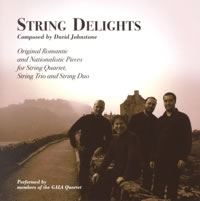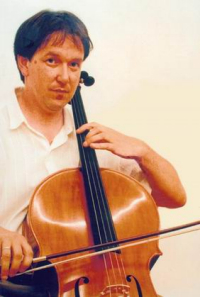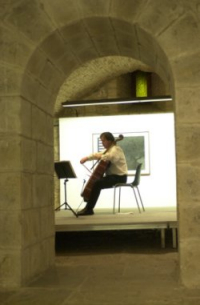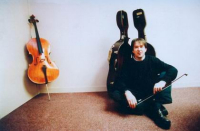| String Delights Music Composed by David Johnstone performed by members of the GALA Quartet |
Original Romantic and Nationalistic Pieces for String Quartet, String Trio and String Duo. Members of the GALA Quartet perfom the compositions of David Johnstone. The members of the 'GALA' String Quartet are: Violin I - Catalin Bucataru; Violin II - Daniel Francés; Viola - Fernando López Garcín; Violoncello - David Johnstone. Buy this album now CD: £12.00 + p&p |
| EUROPEAN JOURNEYS IN STRING QUARTET | ||
| 1 | Fanfare for Europe | 2’28” |
| 2 | ‘English Serious Frolic’ | 3’42” |
| 3 | ‘Slavonic Song’ | 7’12” |
| 4 | Poem for the Basque Country | 5’18” |
| 5 | ‘Mediterranean Skies’ | 4’43” |
| 6 | ‘Song of the Fiords’ | 6’53” |
| 7 | ‘Saxon March’ | 2’23” |
| 8 | ‘Spanish Sarabande’ | 5’10” |
| 9 | ‘Celtic Tarantella’ | 4’47” |
| TWO POPULAR PIECES FOR STRING TRIO | ||
| 10 | ‘Celtic Celebration’ | 2’49” |
| 11 | ‘Song for Her’ | 3’33” |
| PETITE SUITE HISTORIQUE FOR VIOLA AND CELLO DUO | ||
| 12 | I Prélude Baroque | 3’12” |
| 13 | II Chant Romantique | 4’44” |
| 14 | III Marche Neo-classique | 5’51” |
TOTAL DISC TIME |
62'54" | |
Sleeve Notes The motivation of the writing of all these compositions comes from two different lines of thought, both reflected in the title of the general work, and both of a special importance at the beginnings of the 21st century. In fact the idea has been to unite the old and the new Europe. On one hand this project is rather representative of the pleasure that Johnstone feels towards the European Union of the 21st century, having himself shared his life between England and Spain, in particular the Navarre-Basque region. Therefore it should be no surprise that these places are rewarded with a piece each, whilst in the other works it would be more appropriate to speak more of large regions and the generally typical airs rather than name specific countries. However, these works also suggest the respect of
the author towards ‘salon music’ or, to be more exact,
towards ‘salon pieces’ of the 19th century, so important
in their age (in an era before radio, television and recordings
this was then surely the ‘popular’ music of the day)
but unfortunately largely forgotten in today’s world. The
composer has deliberately wished to recuperate this age long tradition
in these pieces, which can be performed individually as separate
pieces or as albums or suites of pieces. 1 - Fanfare for Europe: A striking fanfare to begin an important journey! The small composition is divided in two clear instrumental groups – on one side the two violins, and on the other the viola and cello. Above all a grand majestic feeling reigns. (Dedication: Catalin Bucataru & Daniel Francés) 2 – ‘English Serious Frolic’ is
an apparently light work, but one that covers a more romantic seriousness
that remembers, and indeed makes honour to the name of Edward Elgar;
whilst at the same time one can see the musical humour of David
Johnstone. It is short and compact, with a precise pulsation in
the relaxation or pushing forward of the tempo (‘rubato’),
and the writing generally portrays an ambience or sonority of an
orchestral character within the feel of chamber music. 3 – ‘Slavonic Song’ is
a profound song where the cello imitates the bass singers of some
Eastern European masculine choirs; however all the instruments
have their turn in the lyrical passages. In some moments
there is an almost exaggerated harmonic tension, and although in
the central section the passion lifts itself higher, the melancholy
really reigns throughout the work, and this sadness imposes itself
totally in the final bars of the piece. 4 - Poem for the Basque Country (‘Poema
para Euskalherria’): it is well known that
the Zortzico, a strange but charismatic dance in a 5/8 time, has
its origins in Euskalherria (Basque Country) a long time ago when
it was perhaps more logical to define the area as a great ‘Vasconia’ rather
than the frontiers we know today. In progressive generations the
vitality of this music no only survives but grows, and the work
of Johnstone offers the characteristics of this dance within an
European framework, with a couple of ‘hidden’ local
tunes in appreciation of this country. 5 – ‘Mediterranean Skies’:
this is an elegant piece with a gentle melody, a delicate accompaniment,
generally all very transparent, which all put together gives a
feeling of the romantic ‘swing’ which one can often
feel in many of the Mediterranean zone countries – sunny
days, far removed from the grey clouds and cold weather of other
parts of the continent! The small central section contains
a part of especial interest and expression for the viola. 6 - ‘Song of the Fiords’:
a piece written after nearly all the other quartets to complete
a narrated concert ‘European Journeys in Quartet’.
This is a tender song that describes the love felt by a couple
separated by a long fiord (‘the far shore’). It
is of an undefined place, but could refer to the Scandinavian coast
or equally to Scotland, Ireland or Galicia (north-west Spain).
The music holds a certain air of ancient celtic feel, which becomes
almost modal in the intimate song of the central part. 7 – ‘Saxon March’:
a brief march that tries to capture the personality of the Saxon
regions in the organization of the phrases, the well disciplined
scale-like interventions, and the controlled relaxation of each
instrument. However it also offers a freshness of writing not without
humour and good fun. 9 – ‘Celtic Tarantella’: In
our century the opportunities to journey and work in other countries,
in whatever country of the European Union are greater than ever
before, which results in an absolute mixture of cultures. In the
same way, this musical proposition of Johnstone brings together
the ‘Jig’ of the Celtic people from the north of Europe
with the Tarantella which is principally found in the southern
parts of Italy, all under the influence of the ‘Scherzo’ which
was used regularly since Beethoven’s time by Germanic composers.
The good-bye message is really saying “we live in different
countries but we live in one Europe’ … TWO POPULAR PIECES FOR STRING TRIO PETITE SUITE HISTORIQUE FOR VIOLA AND
CELLO DUO |
| The ‘Petite Suite Historique’ is a Suite of three movements for the unusual combination of a Duo for Viola and Cello. However, it is the part of Viola that generally has the more notable part-writing, the cello embracing the viola lines in a supportive manner. It is not really an historical work as such, more that each title is somewhat orientative and descriptive. For this reason, although the first movement ‘Prélude Baroque’ (dedication: Paula Moriones Jimenez) looks back to the preludes of J.S.Bach one can also find a modern ‘intensity’ present rather in the manner of Resphigi. Perhaps the second movement ‘Chant Romantique’ (dedication: Cristina Aznar & Luis Lorenzana) is the most authentic – the beautiful song of the viola could well be a melody from French opera from the nineteenth century, whilst the last movement ‘Marche Neo-classique’ (dedication: Haizea Sola) is a most happy march in ternary form with little ambiguous references to composers like Milhaud and Prokofiev, but above all ‘well-hearted’ music that makes a positive conclusion to an unusual CD disc. |
Credits Recording Engineer, Editing and Mastering:
Txuma Huarte "Binario" |
| Instruments: | String Quartet/Trio/Duo (Violin 1, Violin 2, Viola, Cello) |
| Genre: | Contemporary |
| Format: | CD |
| Our Ref: | A0161 |
| MCPS: | JM46CD |
| Label: | Johnstone-Music |
| Year: | 2007 |
| Origin: | Spain |
He
is married to Rosa María and has two children, Kevin and
Jon-Erik. They live near Pamplona, the capital city of the Navarre
region of Spain. His hobbies include current affairs and politics,
all things ‘Celtic’ (especially geography and travel),
animals (and animal welfare and animal rights), and most sports
(he is a life-long fan of Reading Football Club!). |
|
| Contact Details | David
Johnstone PO Box 7003 31080 Pamplona Navarra Spain |
| Telephone & Fax | 0034 - 948 - 351869 |
| info@johnstone-music.com | |
| Booking | Please contact David Johnstone (details above) |
| Web site | www.johnstone-music.com |
| Creighton's Collection prints & distributes
David Johnstone's compositions click for details |
|||||
 |
 |
 |
 |
||
| The Scores shown above are recorded on String Delights | |||||

 David
Johnstone is considered one of the most creative and interesting
string players in the Iberian peninsula today, combining a career
as a cellist with that of a busy composer. Although British by
birth he has, for over a decade, been principal cellist of the
'Orquesta Sinfónica de Navarra' of Spain, and a composer
who specializes in string and/or lighter classical writing. In
particular, he composes for all the bowed string instruments
as soloists, and for chamber groups of various sizes (some including
wind and brass instruments). He also specializes in writing String
Orchestra pieces that are well within the capabilities of youth
and conservatoire orchestras, whilst other compositions are better
suited to fully professional ensembles (such as the 'Camerata
Cambrensis', conducted by Caroline Collier, who have premiered
several works). Indeed, many of his compositions are now published
by Creighton's Collection, UK (www.cccd.co.uk / see the section
'
David
Johnstone is considered one of the most creative and interesting
string players in the Iberian peninsula today, combining a career
as a cellist with that of a busy composer. Although British by
birth he has, for over a decade, been principal cellist of the
'Orquesta Sinfónica de Navarra' of Spain, and a composer
who specializes in string and/or lighter classical writing. In
particular, he composes for all the bowed string instruments
as soloists, and for chamber groups of various sizes (some including
wind and brass instruments). He also specializes in writing String
Orchestra pieces that are well within the capabilities of youth
and conservatoire orchestras, whilst other compositions are better
suited to fully professional ensembles (such as the 'Camerata
Cambrensis', conducted by Caroline Collier, who have premiered
several works). Indeed, many of his compositions are now published
by Creighton's Collection, UK (www.cccd.co.uk / see the section
'
 He
is at present a member of the well-established concert trio '
He
is at present a member of the well-established concert trio '






